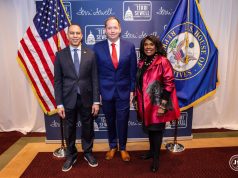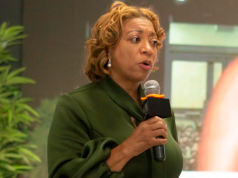By Ryan Michaels
The Birmingham Times
An irritated LaTonya Tate, who chairs Public Safety for the Birmingham City Council, on Tuesday, urged her colleagues to familiarize themselves with the city’s steps to reduce violence after questions were raised about a program in place to provide services for gunshot victims.
The program, called Violence Intervention and Prevention Partners, or VIP2, provides specialists who monitor gun violence survivors over time and coordinates with the outpatient clinical team for follow-up once the patient is discharged.
Councilor J.T. Moore, who asked for a general rundown of the program, said the “challenging part” with the program is that it can only address people after they have been shot.
“We’re constantly bombarded with news reports, articles, things of that nature [about] gun violence that is taking place and with this [program] I know that it will provide some type of intervention for the retaliation piece, but it’s not necessarily intervening in gun violence in general,” Moore said.
Following that statement, Tate said her colleagues may need to attend a weekly community roundtable to hear about the city’s antiviolence programs.
“If you can’t join the roundtable, send your staff…Week after week, day after day, we are looking at initiatives and ecosystems that have been built in places like Baltimore, [Maryland], in Newark, New Jersey,” Tate said.
During Tuesday’s meeting, councilors considered a proposal to provide $2.1 million to fund the VIP2 for three more years. The funding was approved in an 8-0 vote, with Moore abstaining
Moore raised several questions about services offered by the Offender Alumni Association (OAA), which manages VIP2.
Dena Dickerson, program director for OAA, said outreach was not initially included in the plan or funding for VIP2, first conceived by the Jefferson County Department of Health.
Additionally, while VIP2 is still in a pilot phase, OAA is still digging “a little bit deeper” to do more than what the nonprofit has been paid to do “because it is an absolute need,” Dickerson said.
In response to a question from Moore about the “success rate” of the program, Carmone Owens, a violence intervention specialist with VIP2, said every victim that OAA has spoken to about the program has chosen to be part of it.
The OAA team, which is mostly staffed by formerly incarcerated people, serves as a group of “credible messengers” for these violence victims because of their life experiences, Owens said.
“We’re survivors of gunshot injury. We’ve been through incarceration. We understand the nature of the beast of violence, and because of this, we have a peer support component to [the program], along with the case management support,” Owens said.
Tate said that OAA is needed “on the north, the east, the south, the west, every corridor of the city of Birmingham” and that the work of organizations like OAA is “sustained by investments.”
“We can’t police our way out of this, my good colleagues. It’s not gonna happen, but we need to be standing with those that are risking their lives and up 24/7 doing this work. These people’s phones don’t stop ringing…They are in the streets. They can go in places that we cannot tread in,” Tate said.
Councilor President Pro Tem Crystal Smitherman also pointed to the success of programs similar to VIP2 have had in reducing gun violence in other parts of the country, as well as youth programs in which the city has already invested.
Seeing community-wide improvements from various anti-violence programs takes time, Smitherman said.
“These types of programs, it takes a year and a half to two years to see the effects of this, and we have to start somewhere,” Smitherman said. “I mean, maybe we wish we could have started this five years ago, four years ago, but we have to start now.”





